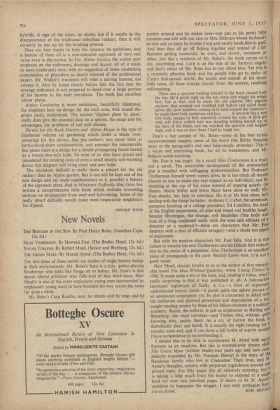New Novels •
THE BEGGARS IN THE.SUN. By Paul Darcy Boles. (Jonathan Cape, 12s. 6d.) SILAS TIMBERMAN. By Howard Fast. (The Bodley Head, 12s. 6d.) YOUNG ToRLESS. By Robert Musil. (Secker and Warburg, 12s. 6d.) THE GREEN MARE. By Marcel Aymd. (The Bodley Head, 12s. 6d.) THE first three of these novels are studies of single human beings in their environments. Mr. Boles's hero is a lazy, guitar-playing Southerner who talks like Synge set to bebop; Mr. Fast's is that decent liberal professor who falls foul of that witch-hunt; Herr Musil's is one of the most unpleasant young men (surrounded by unpleasant young men) to have brooded his way across the scene for quite a while.
Mr. Boles's Carp Rambo, now, he strums and he sings and he putters around and he makes love—not just to his pretty little nineteen-year-old wife but also to Mrs. Hattram whose husband's so rich and so nasty he frames Carp and nearly lands him in gaol.
And then they all go off fishing together and instead of Clint Hattram getting homicidal, he cries, and slowly, somehow or other, just like a sentence of Mr. Boles's, the book comes to a shy, shambling end. Carp is on the side of the Saroyan angels, and that's about all Mr. Boles has to say about him. Yet this is a curiously effective book and the people who go to make up Carp's first-person world, the smells and sounds of his sunny little town, all these emerge cleanly from the uneven, rambling soliloquising.
There was a sparrow bathing himself in the basin second from the top. He'd perch right on the rim there and wiggle his wings. brrt, fast as that, and he made the old pigeons, fifty pigeons anyhow, that preened and waddled and bulked and sailed them- selves like slow bombers coming in to land around the fountain— he made them look cumbrous and lazy. . . . A sparrow has a wise free look, snappy as hell, especially around the eyes. A little girl with soft frizzy yellow hair was standing holding herself up on the bars of the fence, and she watched the sparrow and laughed high, and it was so nice there I had to laugh too.
That's a fair sample of Mr. Boles—some of the best (crisp, unconventional images), some of the worst (the flabby flopping away at the paragraph's end into false-simple attitudes). This is a warm and interesting book, for all its weaknesses, and Mr.
Boles is worth watching.
Mr. Fast is too angry. As a result Silas Timberman is a tract, not a novel. The inexorable development of the overworked plot is handled with unflagging professionalism. But Protestor
Timberman himself never comes alive; he is too much all decent liberals in one to make any real impact as an individual; and by shouting at the top of his voice instead of arguing quietly (as Messrs. Merle Miller and Irwin Shaw have done so well) Mr.
Fast shocks, but fails to convince. He is at his best when he's
dealing with the things he hates: Anthony C. Cabot, the ambitious, pompous humbug of a college president; Ed Lundfest, the head
of the English department, all pipe and tweed and healthy laugh; Senator Brannigan, the strange, evil inquisitor ('the body and face of a thug combined oddly with the eyes and attitude of
dreamer or a madmanl—these are characters that Mr. Fast destroys with a deal of efficient savagery—and a shade too much
of enjoyment. But with his positive characters Mr. Fast fails. And it is this failure to breathe life into Timberman and his friends that reduces him to the status of a puppeteer. Silas Timberman is an excellent piece of propaganda in the early Sinclair Lewis vein; it is not a good novel.
Herr Musil, already known to us as the author of that remark• able novel The Man Without Qualities, wrote Young TOrless in 1906. It made quite a stir at the time, and, reading it today, what's
really surprising is that it was published at all. A humourless Germanic nightmare of Stalky & Co.—a kind of supremely sophisticated horror comic—it paints quite the ugliest picture of an adolescent community yet. Its plot is concerned in detail with
the deliberate and planned perversion and degradation of a t 0Y caught stealing money by three of his fellow-students at a military academy. Basini, the sufferer, is just as unpleasant as Reiting and Beineberg=the chief torturers—and Torless who, without quite knowing why, assists them. As a cry of horror the book is diabolically clear and harsh. It is exactly the right •reading for suicidal week-end, and if you have a full bottle of aspirin around
I have no hesitation in recommending it.
I should like to be able to recommend M. Ayme with equal firmness as an anodyne. But this is warmed-over dreary stuff.
The Green Mare (written twenty-two years ago and now ccir petently translated by Mr. Norman Denny) is the story of the Haudouin family who live in Claquebue. Their lives, and NI' Ayme's thoughts, revolve with perpetual roguishness around one pivotal topic. For fifty pages this all relatively amusing; but it
is asking a little much from the reader to respond at a single level for over two hundred pages. It seems to be M. Ayno's
ambition to humanise the snigger. I can only conjugate biro


































 Previous page
Previous page